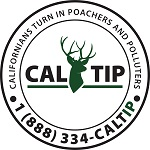About the CALTIP Program
CALTIP (Californians Turn In Poachers and Polluters) is a confidential secret witness program that encourages the public to provide Fish and Wildlife with factual information leading to the arrest of poachers and polluters.
CALTIP was introduced in California in 1981 in order to give Californians an opportunity to help protect the state's fish and wildlife resources. The toll free telephone number operates 24 hours a day, 7 days a week. You do not have to give your name.
Report a Poacher or Polluter
If you witness a poaching or polluting incident or any fish and wildlife violation, or have information about such a violation, immediately dial the toll free CALTIP number 1 888 334-CALTIP (888 334-2258), 24 hours a day, seven days a week.
Or you may submit anonymous tips to CDFW using tip411. tip411 an internet based tool from CitizenObserver.com that enables the public to text message an anonymous tip to wildlife officers and lets the officers respond back creating an anonymous two-way conversation. Anyone with a cell phone may send an anonymous tip to CDFW by texting "CALTIP", followed by a space and the message, to 847411 (tip411).
Or download the free CALTIP smartphone App which operates similarly to tip411 by creating an anonymous two-way conversation with wildlife officers to report wildlife and pollution violations. The CALTIP App can be downloaded for free via the Google Play Store and iTunes App Store.
Be prepared to give the fullest possible account of the incident including the name, address, age and description of the suspect, vehicle description, direction of travel, license number, type of violation and when and where it occurred. You do not have to give your name.
Information from the call is relayed to the CDFW region where the offense occurred and an investigation is undertaken locally. If the information supplied by the caller results in an arrest the caller becomes eligible for a reward. (Up to $3,500 rewards have been granted.) The case is then reviewed by a volunteer citizen's group known as the "CALTIP Rewards Committee".
CALTIP rewards come entirely from donations, no state funds are used. The CALTIP Rewards Committee, not CDFW, receives and administers these funds. Money not used for the payment of rewards goes toward furthering CALTIP's educational goals.



Text to 847411:
"CALTIP [your message]"


NOTE: Violations submitted online will only be read during regular business hours from 8:00 a.m. and 5:00 p.m. Monday through Friday.
For in-progress violations please call our CALTIP line at 1-888-334-2258, 24 hours a day, seven days a week.
Poaching
Poaching is the illegal take of fish and wildlife. It can involve hunting or fishing out of season, the taking of more fish or game animals than the law allows, or illegal commercialization of our wildlife. It can also include trespassing, hunting or fishing in closed areas such as Marine Life Protection Areas or Game Reserves. All species of wildlife in California are affected; some of the most commonly poached include deer, bear, antelope, elk, abalone, sturgeon, salmon, crab and lobster. Poachers devastate the state’s natural resources by breaking laws designed to assure proper wildlife management and species survival, its full impact on California’s ecology is impossible to gauge. Equally devastating crimes include pollution and habitat destruction and the insidious practice of transporting and introducing non-native, undesirable fish (like northern pike and white bass) into California's lakes and rivers.
State Wildlife officers do all they can to combat poaching. But there are only a few hundred wildlife officers spread throughout California. To successfully fight poaching they must have help from all Californians.
Pollution
As California’s population swells, the ill effects of pollution and habitat destruction are increasingly detrimental to our natural resources. Fish and Wildlife considers incidents of agricultural pollution, dumping of household waste, industrial spills and illegal marijuana gardens to be serious crimes, as they devastate native species and the habitat they need to survive. To combat polluting, concerned citizens who become aware of such acts can become involved and report their observations.
Hunting Outside of California?
Check the International Association of Natural Resource Crimestoppers website for information about initiatives similar to CDFW’s CALTIP program throughout Canada and the United States.
Direct inquiries about the CALTIP program to Lt. Matthew Shanley, Matthew.Shanley@wildlife.ca.gov